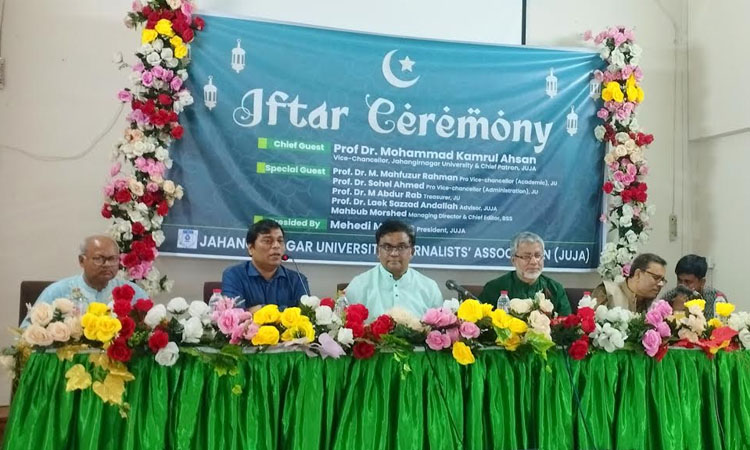News Flash
News Flash

JAHANGIRNAGAR UNIVERSITY, Mar 15, 2025 (BSS) - Jahangirnagar University Journalists’ Association (JUJA) today hosted an Iftar Mahfil at the university’s Senate Hall.
Faculties, leaders of various student bodies and a good number of former students of the university joined the Iftar.
Prior to the Iftar, a discussion was held where JU Vice-Chancellor Prof. Dr. Kamrul Ahsan addressed as the chief guest with JUJA President Mehedi Mamun in the chair.
Pro-VC (Academic) of the university Prof. Dr. Mahfuzur Rahman, Pro-VC (Admin) Prof. Dr. Sohel Ahmed, Treasurer Prof. Dr. Abdur Rab, JUJA Adviser Prof. Dr. Laek Sazzad Andallah, Managing Director and Chief Editor of Bangladesh Sangbad Sangstha (BSS) Mahbub Morshed spoke at the event as the special guests.
Speaking on the occasion, JU VC Prof. Kamrul Ahsan said, “JUJA is the first campus-based journalists' organization established after Bangladesh’s independence. Their contribution over the years has been remarkable, especially during the July uprising in 2024.”
He hoped that JUJA members would continue the legacy of professionalism and objective journalism.
Taking part in the discussion, Mahbub Morshed, Managing Director and Chief Editor of BSS said, “After the mass uprising, we have regained our freedom and we must have to ensure that we never lose it again. The fresh air of freedom that we are breathing must be preserved.”
“No matter our ideological differences, we must remain united in the national interest to prevent the return of fascism,” he added.
JUJA Secretary Abdullah Al Mamun moderated the programme.
Besides, Abdul Rashid Jitu, convener of the Anti-Discrimination Students’ Movement, Wasim Ahmed Onik, Member Secretary of JU Jatiyatabadi Chhatra Dal, Muhibur Rahman Muhib, President of Islami Chhatra Shibir, Touhid Mohammad Siam, Senior Joint Convener of the Bangladesh Democratic Students’ Council, Sohagi Samia, Organizer of Samajtantrik Chhatra Front and Zahidul Islam Imon, General Secretary of the JU unit Chhatra Union, along with leaders from various social and cultural organizations were present, among others.